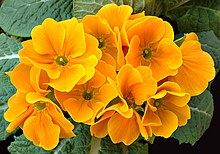Mesangiosperm
| Mesangiospermae | |
|---|---|
 |
|
| Primula hortensis | |
| Scientific classification | |
| Kingdom: | Plantae |
| Subkingdom: | Embryophyta |
| (unranked): | Spermatophyta |
| (unranked): | Angiosperms |
| (unranked): | Mesangiospermae |
| Groups | |
| Synonyms | |
|
|
Mesangiospermae (core angiosperms) is a group of flowering plants (angiosperms), informally called "mesangiosperms". They are one of two main clades of angiosperms. It is a name created under the rules of the PhyloCode system of phylogenetic nomenclature. There are about 350,000 species of mesangiosperms. The mesangiosperms contain about 99.95% of the flowering plants, assuming that there are about 175 species not in this group and about 350,000 that are. While such a clade with a similar circumscription exists in the APG III system, it was not given a name.
Besides the mesangiosperms, the other groups of flowering plants are Amborellales, Nymphaeales, and Austrobaileyales. These constitute a paraphyletic grade called basal angiosperms. The order names, ending in -ales are used here without reference to taxonomic rank because these groups contain only one order.
Mesangiospermae includes the following clades:
The mesangiosperms are usually recognized in classification systems that do not assign groups to taxonomic rank. The name Mesangiospermae is a branch-modified node-based name in phylogenetic nomenclature. It is defined as the most inclusive crown clade containing Platanus occidentalis, but not Amborella trichopoda, Nymphaea odorata, or Austrobaileya scandens. It is sometimes written as /Mesangiospermae even though this is not required by the PhyloCode. The "clademark" slash indicates that the term is intended as phylogenetically defined.
...
Wikipedia
